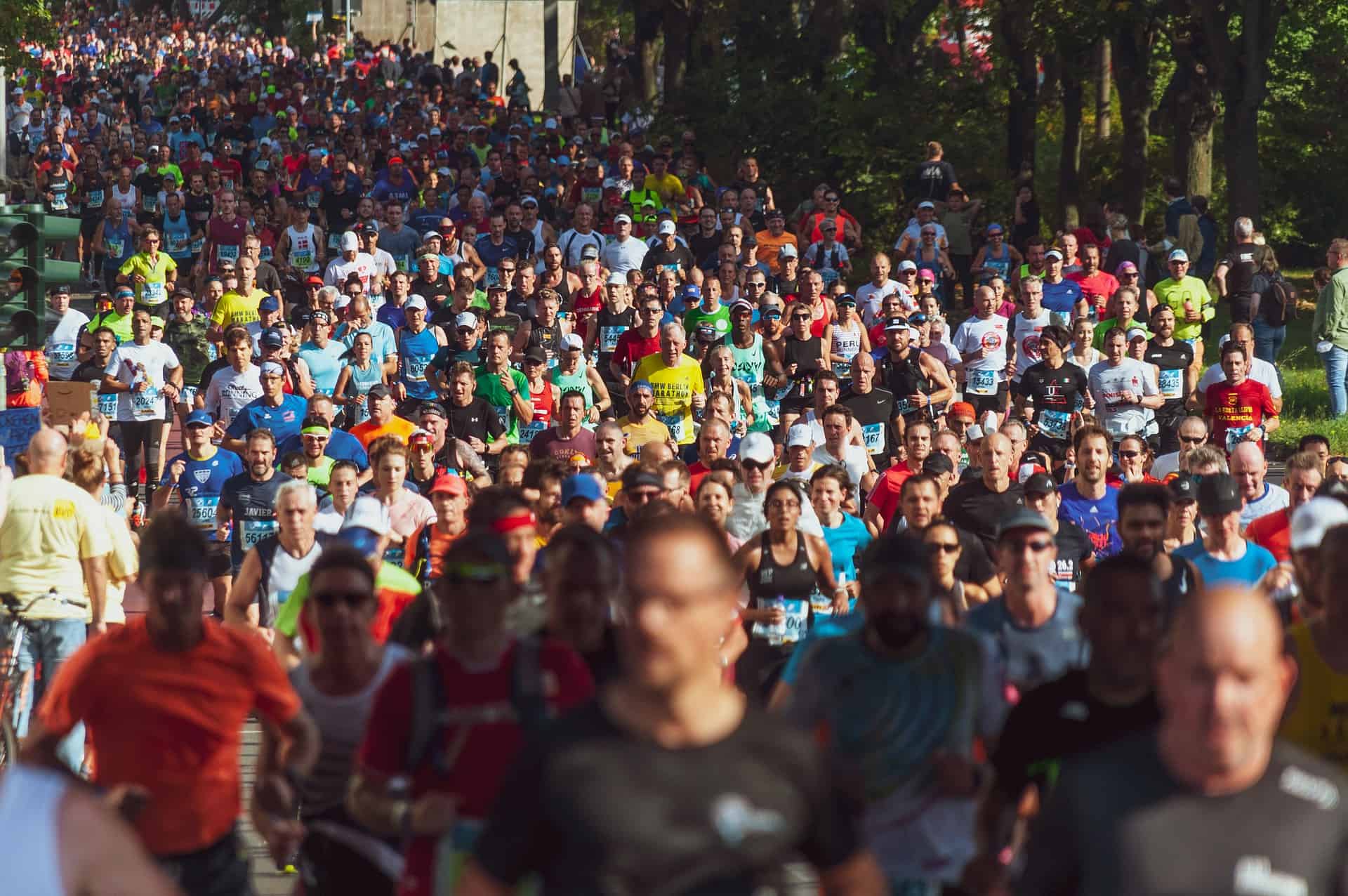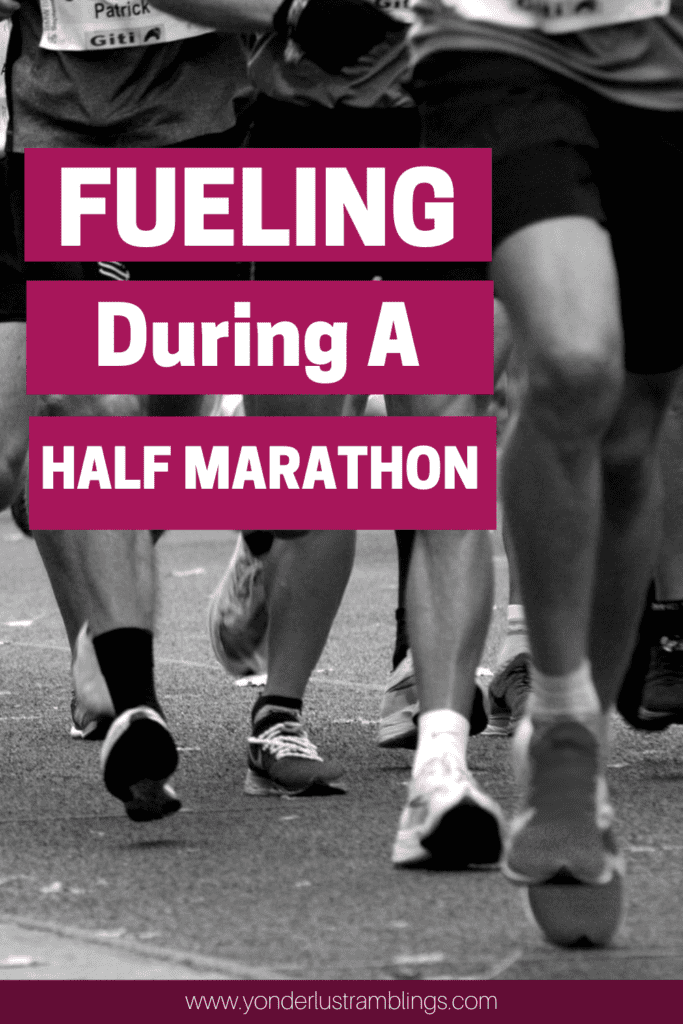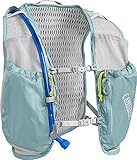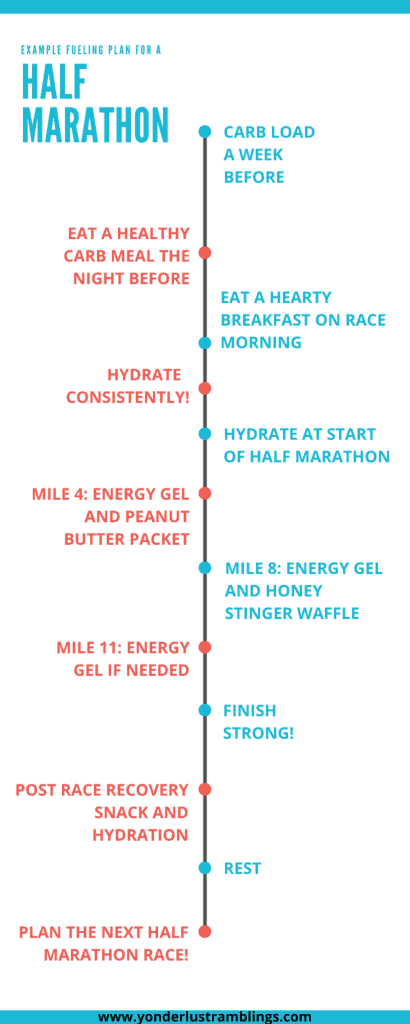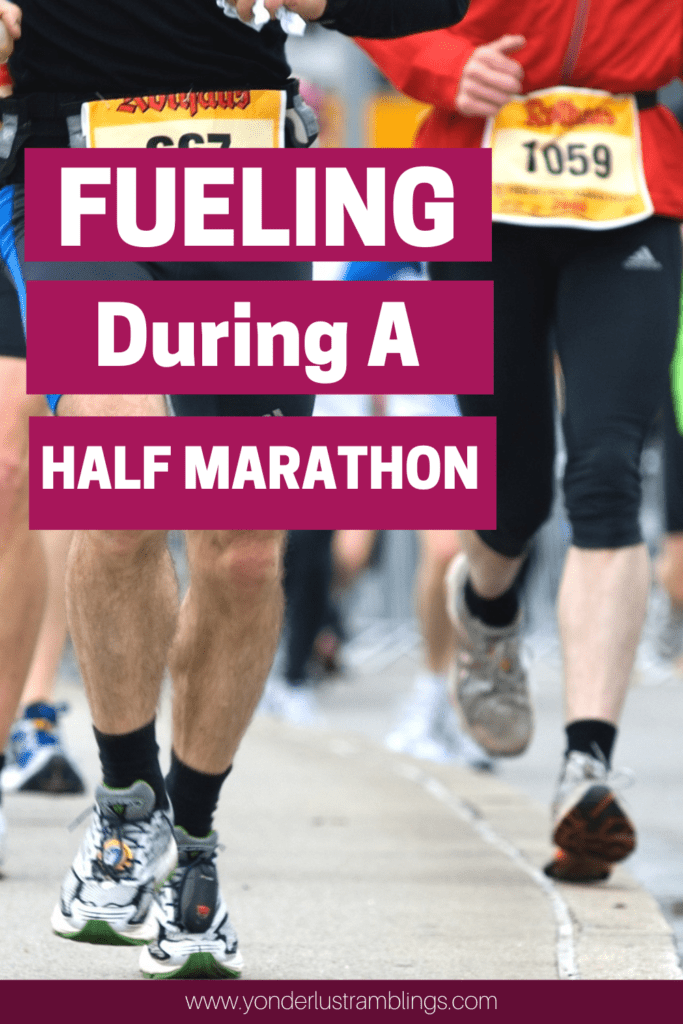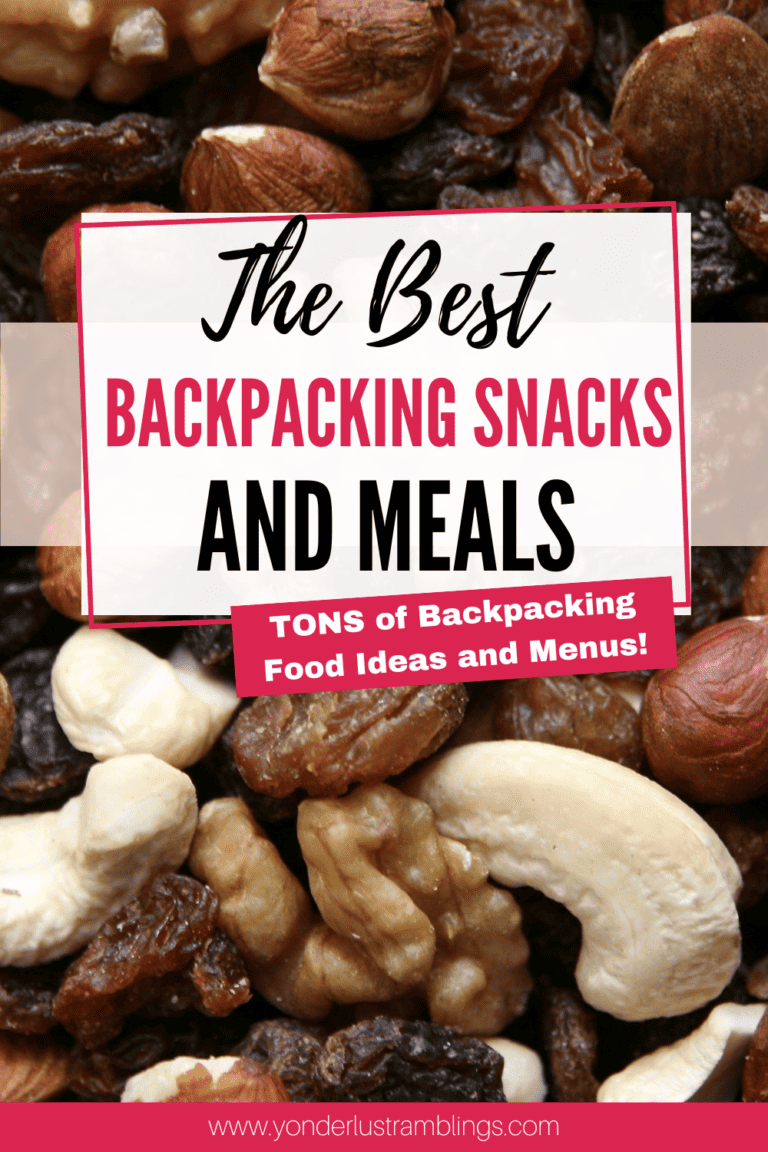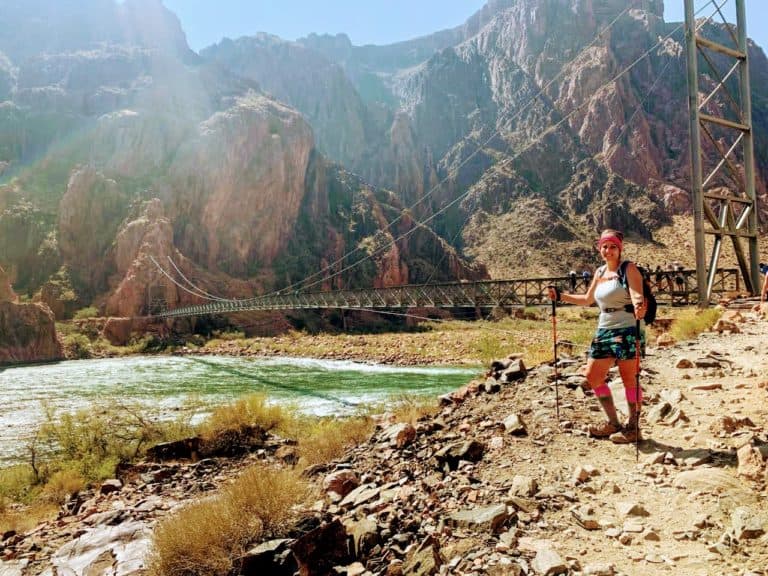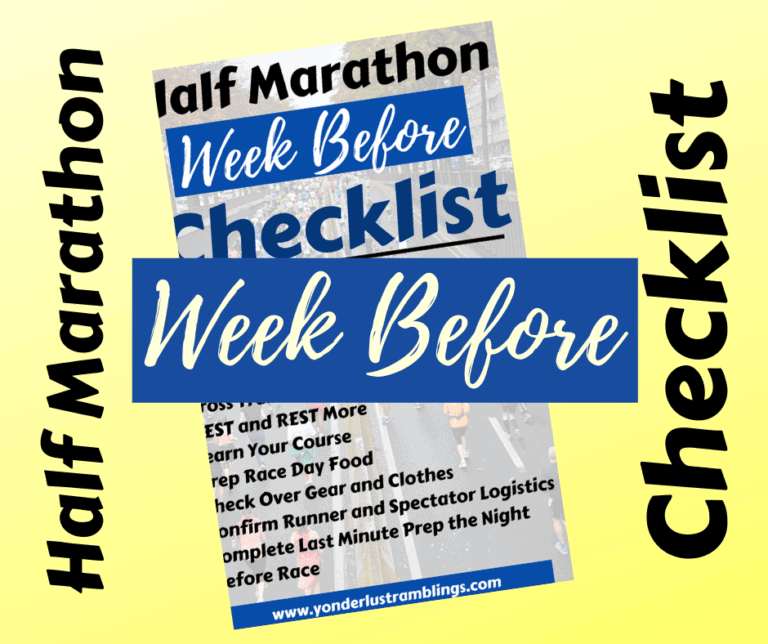Do I Need to Fuel During a Half Marathon?
It all comes down to race day morning. All the training runs, the proper fueling, the rest and cross training. The researching gear and testing out what works for you and your body during those weekly practice runs. One final thought that goes through a lot of runners minds, especially new runners right before their first half marathon, is do I need to fuel during a half marathon? You may be surprised at the answer! This guide covers everything related to fueling for a half marathon and what to eat during a half marathon.
Disclosure: Below are some affiliate links-these are all products I highly recommend. I won’t make any recommendations on this page that I haven’t tested or personally used!
Table of Contents
Do I Need to Fuel During a Half Marathon?
The simplest way to answer this question, is YES. For the majority of runners out there, especially newer runners, you do need to fuel during a half marathon.
My hope though, is that you are not just discovering this for the first time on the morning of your half marathon race. How you fuel, how often, and with what foods, are questions you should learn the answers to on all those practice runs and training weeks leading up to your half marathon. And this post is a great place to start learning how to do that.
If you are following a half marathon training schedule, like my 16 week half marathon training calendar, you should immediately notice that one of the key ingredients to a successful training plan is weekly, incrementally increased, long runs. In fact, that last long run before your half marathon race should total at least 10 miles in length.
So in theory, you should be learning how to fuel in the weeks and months leading up to your race. If you are one of the few people that can run 10 miles without a mid run fuel of some type, you might be one of those few people that can run a whole half marathon without. But most likely you will find that your performance and comfort level are improved at that type of mileage, with the right kind and right amount of fuel. So let’s talk about how and what to fuel with, and how that plays out on race day morning of your half marathon!
READ MORE: What else do you need to think about on race day morning? Find the answer with your “morning of race day” checklist!
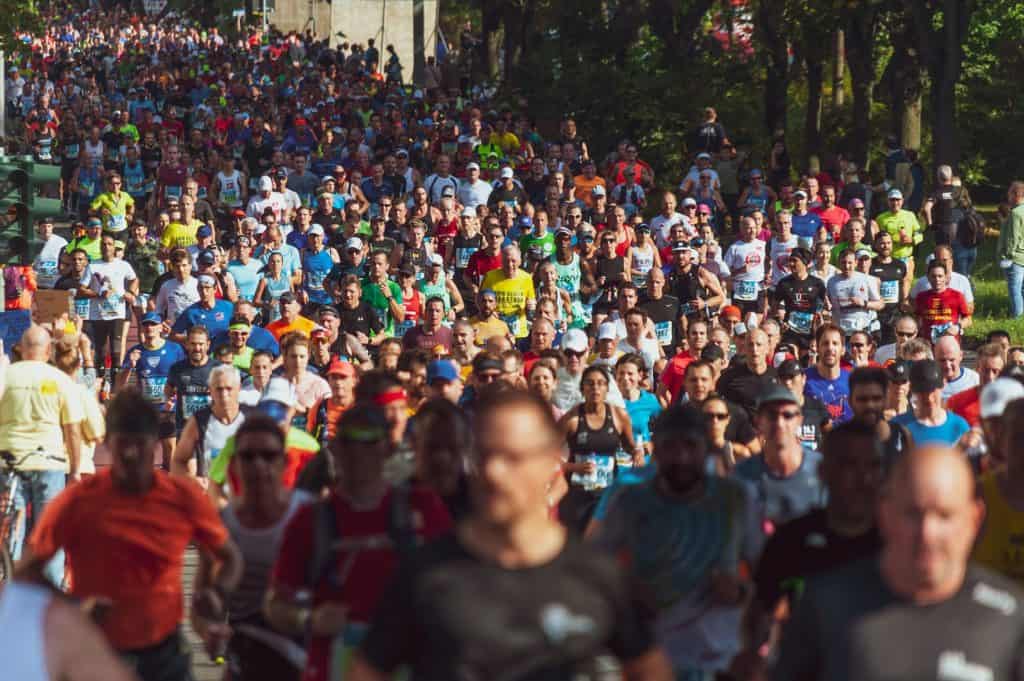
So Why Do I Need to Fuel During a Half Marathon?
Simply put, because of science and biology. Your body is only meant to store enough glucose, the ingredient that fuels your muscles, to fuel a half marathon level amount of exertion for about an hour or an hour and a half or so of high intensity output, depending on the person.
Secondly, during a half marathon (or any high intensity activity), your body runs on fats and carbs. However, fats break down slower than carbs, so they are not the best option for energy, or what will be depleted first, during a half marathon – therefore carbs are! According to studies on carb supplementation’s affect on performance, your carb stores will be the first line of defense for fuel and will be more quickly depleted, therefore, it benefits the runner to help replenish them, especially at the half marathon length.
While one benefit of training is that you can help your body learn to rely on stored fats more and not solely on stored carbs, the reality is that you will likely find your performance boosted and comfort level enhanced if you plan to replenish some of those fast burning carb supplies during your half marathon. You are also less likely to hit the dreaded runner’s “wall” that so many half marathoners struggle with, where you start to crash.
How Do I Fuel During a Half a Marathon?
Some runners prefer to take small, consistent snacks every 15 or 20 minutes of their half marathon race. Others prefer to have a larger amount every 45 minutes or an hour. I have done both. A general rule of thumb for the average half marathoner is to average 30 – 60 grams of carbs per hour of a half marathon.
For example, on some long runs and half marathon distances, I have brought an RX bar, and had a bite of it every 15 minutes. Other times, I have eaten a Honey Stinger Waffle more or less in one “sitting” at the 1 hour-ish mark. In addition, I may supplement with a GU energy gel twice throughout my half marathon.
The other thing to consider is your pace. If you have a history of running a sub 2 hour half marathon pace, then you can consider a plan that has you fueling about once an hour, or twice a race. If you are a runner who is more on pace to finish in over 2 hours, or even closer to 3 hours or more, than you may want to plan on fueling 2 – 3 times during your race.
By those last couple weeks of long training runs, you should be able to largely determine and predict what your half marathon pace will be, and approximately how long it will take to finish. I know if it is your first half marathon race, this may be less of a hard and fast rule, as you will have to see for yourself how race day morning plays out for the first time. This race time predictor can help you get a more accurate predicted time for your half marathon.
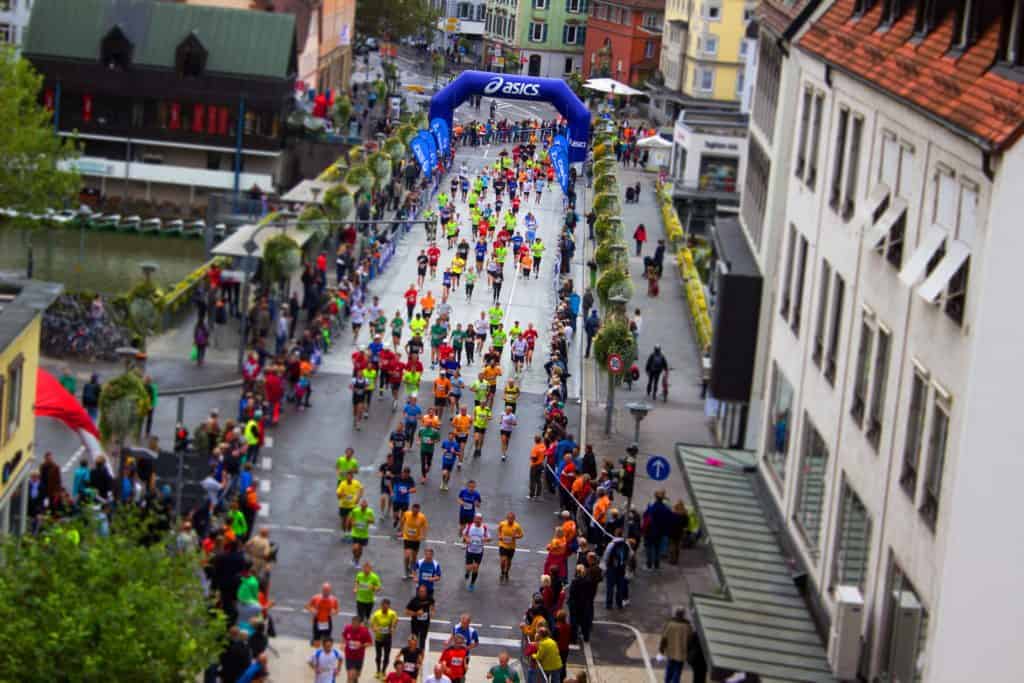
Have a Plan on How to Fuel During a Half Marathon
Here’s a few considerations for your half marathon fueling plan and knowing what to eat during a half marathon:
- Figure out what works for you during your training runs (don’t wing it race day morning!)
- Do NOT experiment with anything new on race day morning! Stick with what you know works.
- Avoid foods that are high in fiber, spicy, excessive dairy, etc. Many runners prefer their morning coffee before a half marathon race, but make sure you have tried and tested this before race day morning, if you plan to drink coffee before your run. You don’t want to be scrambling for a bathroom mid race!
- DO have a pre race meal (check out my post on what to eat before a half marathon)
- Don’t forget to HYDRATE! This should be happening daily and consistently throughout training – don’t make the mistake of thinking that proper hydration is chugging a water bottle right before your race. Make it a consistent part of your daily routine leading up to and during your half marathon race!
>>>>Need Help Tracking Your Daily Water Intake? Grab this handy Daily Water Tracker printable HERE!
- Find out if your race has aid stations (all half marathons should), and at what distances they are stationed. Utilize these aid stations, especially if they have food and snacks in addition to water, and make them a part of planning out how you fuel during your half marathon. It may mean not having to carry as much fuel on you.
- Know HOW you will plan to carry whatever you plan to fuel with during your race.
>>>For less “supported” races, like wilderness trail runs, I run with this Camelbak hydration vest that also comes equipped with plenty of storage for personal items, phones, and of course, snacks! It also is water bladder compatible.
- RUNNING HYDRATION VEST FOR WOMEN: The infusion of 3D Micro Mesh, ultra-lightweight materials, and reflectivity make the CamelBak Women’s Circuit Hydration Vest the preferred choice of trail and ultra runners looking for a minimalist running vest.
>>>For supported road and trail races with more availability of aid stations, I run with this smaller Hydration Running Waistbelt that can carry my water bottle, personal items, and smaller fuel items.
- COMFY RUNNING WAIST BELT: Made to keep you in motion, the FlipBelt is an exercise-belt phone holder and carrier pouch for small vital essentials. Designed to pull on and lay flat on your hips without slipping, it is a light alternative to bulky running bags and armbands.
- (It is up to you to find a transport system that works for you – another thing to figure out during trial and error during your training months!) And don’t be afraid to mix and match. Not only do I utilize both of these systems above depending on the circumstances of my run, I also use these pocketed legging biker shorts and these small handheld water bottles on lots of my shorter training runs, or shorter distances like 5k’s and 10k’s, in addition to using aid stations to refill.
- Do not wait until all your energy is zapped to replenish those carbs. By then, it’ll be too late. If you are going to have that energy gel or chew, or that peanut butter packet, plan to do so before your stores are completely used up. Again, training will help you know when that point is. But for a half marathon distance, especially if you predict you will finish in over 2 hours, I would take that first fuel break prior to the one hour mark.
- In short, consider fueling around the 45 minute – 60 minute mark of your half marathon.
- Fuel again 45 minutes – 60 minutes later. Many runners try to average 30 – 60 grams of carbs per hour. How you do that is up to what works for you. (If you anticipate your half marathon may take you closer to 3 hours or more to finish, you may need more carbs).
- Know your Aid Stations: some aid stations will have snacks in addition to water and sports drinks. If you know your aid stations are going to be stocked with some kind of “granola” type bar, you may not need to carry your own. Many aid stations carry energy gels as well. If that is something that you have tried in training that works well for you, you can plan to utilize them at the aid stations too.
- Don’t forget a recovery snack after your race! I don’t always feel like eating right after finishing a half marathon, or any long distance, but it will help prevent a crash later. Eat a banana, a granola bar, or a recovery drink to start with.
Example Half Marathon Fueling Plan
So how does this all look put together? Here’s an example half marathon fueling plan based on my experience of completed half marathons:
- Start good carb loading a week prior as part of your “week before half marathon” checklist (with good carbs, healthy fats, proteins, and fruits and vegetables as well, of course!)
- Follow my recommendations for what to eat the night before a half marathon
- Eat a hearty breakfast of oatmeal, toast and peanut butter, banana, applesauce, nuts, etc., as part of your race day morning checklist.
- Hydrate consistently, always!
- Start of Half Marathon! I like to hydrate one last time right before the starting whistle!
- Mile 4: energy gel and squeezable peanut butter packet (find out why just why peanut butter is the ultimate runner’s power fuel!)
- Mile 8: energy gel and RX bar or Honey Stinger Waffle
- Mile 11: energy gel (if needed)
This is not a hard and fast example, and it varies each race. Often, I find that I only need either the peanut butter or RX bar / Honey Stinger Waffle around Mile 8. Also often, I don’t always need the final gel, depending on how I am feeling.
A lot of factors can affect your fueling needs, like how you trained leading up to the race, your diet in the week and day leading up to the race, your hydration, and just overall health and energy.
Also, consider the route details and weather conditions of your half marathon!
Is your route filled with hills? You may want to count on fueling more.
What about if your weather is hot? Possibly more fuel, and definitely more hydration!
These are all things to know in the week leading up to your half marathon race.
That being said though, I almost always at least BRING those items mentioned in my Camelbak Hydration vest,or in my running hydration waistbelt, so that I have them if needed. I have never personally run a half marathon race where I didn’t need some kind of fuel.
Best Runner Foods to Fuel During a Half Marathon
So what are the best foods to fuel with during a half marathon? I recommend lightweight, compact, easily digestible, and easy to eat quickly, on the go, and with one hand! Here’s a few of my favorites:
- Nuts
>>>(if you don’t like gels, try Honey Stinger Energy chews or CLIF blocks)
So How Should I Fuel BEFORE a Half Marathon?
As I mentioned before, you can find out all the details about what to eat before a half marathon race HERE! But here’s a short summary:
Think good, healthy carbs, healthy fats, and proteins. Start incorporating more and more of these food items into your diet in the week leading up to your half marathon race. Culminate with a “carb load” dinner the night before.
Recommended foods: sweet potatoes, chicken, fish, whole grain pasta and breads, eggs, bananas, avocado, nuts, kale, spinach, lentils, oats
Don’t forget about race day breakfast! Make sure to build time into your race day morning checklist to have a good hearty breakfast. Follow the same rules as you have been: don’t experiment with anything new, stick to what you know has worked for you in your training runs. Think easily digestible and carbs, while avoiding high fiber, excessive dairy, spicy foods, etc.
Recommended breakfast foods: Toast or bagel with peanut butter, oatmeal with peanut butter, banana, small applesauce packet, small yogurt with granola, handful of nuts, plenty of water, and coffee if it has worked for you during your long training runs. Know how coffee affects your internal system – you don’t want to be scrambling for a toilet 20 minutes into your half marathon race!
Final Thoughts on Fueling During a Half Marathon
My final thought on answering the question, do I need to fuel during a half marathon, is this: figure out what works for you before. No plan is a one size fits all plan. But you are in the right place to start learning what works for you, by figuring out a foundation first, and then building in the muscles of that foundation from your own tried and true experience!
RELATED ARTICLES:
- What to Eat the Night Before a Long Run
- The Truth About Peanut Butter for Runners
- Best Foods and Diet for Runners
PIN for LATER!
Last update on 2023-08-09 / Affiliate links / Images from Amazon Product Advertising API

